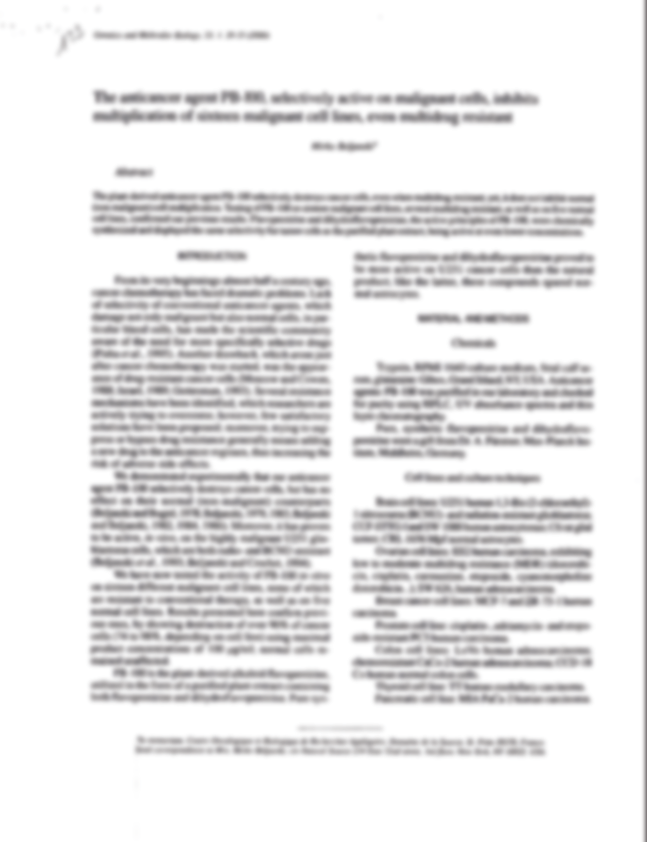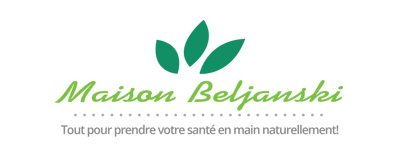100 – Three alkaloids as selective destroyers of the proliferative capacity of cancer cells
IRCS Med. Sci., 12, 1984, pp. 587-588
Available in English only
ABSTRACT: Most of the anti-cancer drugs at present used in cancer chemotherapy exhibit tissue toxicity and cause severe damage to harmatopoietic cells. In addition, they are mutagenic and/or carcinogenic in animals and in plants. Using the Oncotest, we have selected three alkaloïds, alstonine, serpentine and sempervirine that possess the capacity to sistinguish in vitro between DNAs isolated from cancerous and healthy mammalian and plant tissues. They bind to the initiation sites of destabilized cancer DNA synthesis, without affecting that of DNAs from healthy tissues. Here we demonstrate that each of the three alkaloïds, which remain inactive against normal eukaryotic cells, selectively and completely destroys the proliferative potential of various established cancer cell lines maintained in and in vitro culture.
ABSTRACT: Most of the anti-cancer drugs at present used in cancer chemotherapy exhibit tissue toxicity and cause severe damage to harmatopoietic cells. In addition, they are mutagenic and/or carcinogenic in animals and in plants. Using the Oncotest, we have selected three alkaloïds, alstonine, serpentine and sempervirine that possess the capacity to sistinguish in vitro between DNAs isolated from cancerous and healthy mammalian and plant tissues. They bind to the initiation sites of destabilized cancer DNA synthesis, without affecting that of DNAs from healthy tissues. Here we demonstrate that each of the three alkaloïds, which remain inactive against normal eukaryotic cells, selectively and completely destroys the proliferative potential of various established cancer cell lines maintained in and in vitro culture.
99 – The Regulation of DNA Replication and Transcription. The Role of Trigger Molecules in Normal and Malignant Gene Expression
Experimental Biology and Medicine, vol.8, Karger (1983), pp. 1-190.
Available in English only
ABSTRACT: This monograph explores basic processes of DNA replication and transcription in an effort to identify the mechanisms responsible for the release of genetic information and its role in the regulation of cellular events.
ABSTRACT: This monograph explores basic processes of DNA replication and transcription in an effort to identify the mechanisms responsible for the release of genetic information and its role in the regulation of cellular events.
98 – Leucocyte Recovery With Short-Chain RNA Fragments in Cyclophosphamide-Treated Rabbits
Ce document n'est pas disponible en ligne.
Document not available online
97 – Tumor promoter (TPA), DNA chain opening and unscheduled DNA synthesis
IRCS Med. Sci., 11, 1983, pp. 363-364.
Available in English only
ABSTRACT: Tumor promoters accelerate the proliferative capacity of tumor cells although at high concentrations they may induce carcinogenesis in animals. Recently it was shown that TPA, (12-0)trtradecanoyl-phorbol-13-acetate), the tumor promoting phorbol ester, appears to act in a similar fashion on normal embryonal diploid and cancer cells. TPA induces differentiation of leukemic cells, activetes silent genes for specific r-RNA synthesis in hybrid cells and promotes cell proliferative capacity or phenotypic cellular changes. Here we report the in vitro effect of TPA on DNA secondary structure and DNA in vitro synthesis.
ABSTRACT: Tumor promoters accelerate the proliferative capacity of tumor cells although at high concentrations they may induce carcinogenesis in animals. Recently it was shown that TPA, (12-0)trtradecanoyl-phorbol-13-acetate), the tumor promoting phorbol ester, appears to act in a similar fashion on normal embryonal diploid and cancer cells. TPA induces differentiation of leukemic cells, activetes silent genes for specific r-RNA synthesis in hybrid cells and promotes cell proliferative capacity or phenotypic cellular changes. Here we report the in vitro effect of TPA on DNA secondary structure and DNA in vitro synthesis.
Document not available online
95 – Oncotest: dépistage des potentiels cancérogènes et spécifiquement anti-cancéreux. Conceptions et perspectives nouvelles en cancérologie
Environnement et nouvelle médecine. n°2, 1982, pp. 18-23.
Document not available online
Document not available online
94 – Preventive and curative anticancer drug. Application to Crown-gall tumors
Acta Horticulturae, n°125, 1982, pp. 239-248.
Document not available online
Document not available online
93 – Agonist and/or antagonists effects of plant hormones and an anticancer alkaloid on plant DNA structure and activity
IRCS Medical Science, 10, 1982, pp. 689-690.
Available in English only
ABSTRACT: Using a biochemical assay system (Oncotest) we have shown that DNAs from cancerous mammalian and plant cells are destabilized compared to DNA from healthy cells. Cancer DNAs susceptible to the action of carcinogens or other different compounds exhibit in vitro and in vivo a high template activity in comparison to DNAs from healthy cells. We have also shown that alstonine, a plant alkaloïd prepared in our laboratory which selectively binds to DNA from cancer cells prevents DNA in vitro synthesis as well as cancer cells in vivo multiplication in animals and plants. It has slight effect on DNA from healthy cells. We describe here the effects of auxin (IAA) and kinetin (K) (two cell growth and division hormones in higher plant species) and that of alstonine (BG-8) on in vitro synthesis and strand separation of DNAs isolated from cancerous, habituated and healthy plant cells cultures in vitro.
ABSTRACT: Using a biochemical assay system (Oncotest) we have shown that DNAs from cancerous mammalian and plant cells are destabilized compared to DNA from healthy cells. Cancer DNAs susceptible to the action of carcinogens or other different compounds exhibit in vitro and in vivo a high template activity in comparison to DNAs from healthy cells. We have also shown that alstonine, a plant alkaloïd prepared in our laboratory which selectively binds to DNA from cancer cells prevents DNA in vitro synthesis as well as cancer cells in vivo multiplication in animals and plants. It has slight effect on DNA from healthy cells. We describe here the effects of auxin (IAA) and kinetin (K) (two cell growth and division hormones in higher plant species) and that of alstonine (BG-8) on in vitro synthesis and strand separation of DNAs isolated from cancerous, habituated and healthy plant cells cultures in vitro.
92 – Selective Inhibition of in vitro Synthesis of Cancer DNA by Alkaloids of ß-Carboline Class
Expl. Cell. Biol., 50, 1982, pp. 79-87
Available in English only
ABSTRACT: The high template in vitro activity of native DNA from cancerous mammalian and plant tissues, compared to DNA from healthy tissues, enabled us to select substances which selectively inhibit cancer DNA synthesis. Among them, alstonine, serpentine, sempervirine and flavopereirine, all alkaloids which belong to the Beta-carboline class, distinguish cancer DNA from healthy tissue DNA inhibit DNA in vitro synthesis when native DNA from different cancerous tissues or cells is used as template. They have practically no effect on DNA from healthy tissues. The inhibitory effect of alkaloids is due to their capacity to form an ‘alkaloid-cancer DNA’ complex which has been characterized by use of the Sephadex column. Evidence is presented showing that these alkaloids inhibit the initiation of DNA synthesis but not chain elongation. The stimulating action caused by carcinogens during cancer DNA in vitro synthesis may be prevented and reversed by alkaloids. Furthermore, the stimulating action of steroids during in vitro synthesis of hormone target tissue DNA might be neutralized by alkaloids. However, at relatively high doses, steroids reversibly compete with alkaloids for binding sites on breast cancer DNA. This is not observed with DNA from nonhormone target tissues.
ABSTRACT: The high template in vitro activity of native DNA from cancerous mammalian and plant tissues, compared to DNA from healthy tissues, enabled us to select substances which selectively inhibit cancer DNA synthesis. Among them, alstonine, serpentine, sempervirine and flavopereirine, all alkaloids which belong to the Beta-carboline class, distinguish cancer DNA from healthy tissue DNA inhibit DNA in vitro synthesis when native DNA from different cancerous tissues or cells is used as template. They have practically no effect on DNA from healthy tissues. The inhibitory effect of alkaloids is due to their capacity to form an ‘alkaloid-cancer DNA’ complex which has been characterized by use of the Sephadex column. Evidence is presented showing that these alkaloids inhibit the initiation of DNA synthesis but not chain elongation. The stimulating action caused by carcinogens during cancer DNA in vitro synthesis may be prevented and reversed by alkaloids. Furthermore, the stimulating action of steroids during in vitro synthesis of hormone target tissue DNA might be neutralized by alkaloids. However, at relatively high doses, steroids reversibly compete with alkaloids for binding sites on breast cancer DNA. This is not observed with DNA from nonhormone target tissues.
91 – Crown-gall Tumor Stimulation or Inhibition: Correlation with DNA Strand Separation
Proc. Fifth Int. Conf. Plant Path. Bact. Cali, 1981, p. 295-307
Available in English only
ABSTRACT: The effects of the carcinogen dimethylbenz (a)anthracene, of antimitotic drugs (cyclophosphamide and daunorubicin), of the plant hormone (auxin IAA) and the antimitotic mitomycin C were investigated in vitro on cancer and healthy DNA from pea seedings, inoculated or not, with oncogenic agrobacterium tumefaciens. These substances stimulate in vitro both synthesis and strand separation of Crown-gall DNA as well as oncogenic A. tumefaciens DNA, while they have little effect on normal plant DNA as is the case with E.coli and non-oncogenic A. tumefaciens DNA. This correlates with the substance-enhancing-power on in vivo Crown-gall cell multiplication. Growth-stimulatory or inhibitory-effects are antagonized by the tumorless action of E. coli small size RNA-fragments. Plant ribonuclease is under control of all these compounds and the RNA-fragments compensate for increased or decreased ribonuclease activity induced by cyclophosphamide, daunorubicin, dimethylbenz(a) anthracene or auxin. There appears to be a correlation between ribonuclease activity and Crown-gall cell development.
ABSTRACT: The effects of the carcinogen dimethylbenz (a)anthracene, of antimitotic drugs (cyclophosphamide and daunorubicin), of the plant hormone (auxin IAA) and the antimitotic mitomycin C were investigated in vitro on cancer and healthy DNA from pea seedings, inoculated or not, with oncogenic agrobacterium tumefaciens. These substances stimulate in vitro both synthesis and strand separation of Crown-gall DNA as well as oncogenic A. tumefaciens DNA, while they have little effect on normal plant DNA as is the case with E.coli and non-oncogenic A. tumefaciens DNA. This correlates with the substance-enhancing-power on in vivo Crown-gall cell multiplication. Growth-stimulatory or inhibitory-effects are antagonized by the tumorless action of E. coli small size RNA-fragments. Plant ribonuclease is under control of all these compounds and the RNA-fragments compensate for increased or decreased ribonuclease activity induced by cyclophosphamide, daunorubicin, dimethylbenz(a) anthracene or auxin. There appears to be a correlation between ribonuclease activity and Crown-gall cell development.




